-
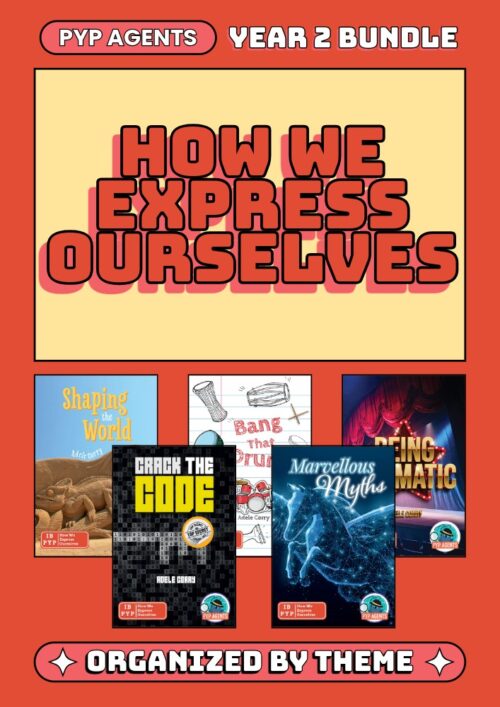 PYP Agents Year 2 How We Express Ourselves book bundle. Five books that support inquiry into the ways in which we discover and express ideas, feelings, nature, culture, beliefs and values; the ways in which we reflect on, extend and enjoy our creativity; our appreciation of the aesthetic. Crack the Code: There are lots of ways to send messages. They could be things we want to keep secret, to places very far away or even to communicate with robots! Read this book to crack the code. [Read more…] Marvellous Myths: Long ago, people created stories to understand the world. These stories had heroes, monsters and strange places, like a man who is half spider, a woman with snakes for hair and a lost city made of gold. Which myths do you know? [Read more…] Shaping the World: You can make sculptures out of almost anything. There are the Ancient Greek statues made of marble and bronze, the Chinese emperor’s army of terracotta soldiers, and even sculptures made out of chocolate! [Read more…] Bang That Drum: The first drum was invented thousands of years ago. They have been part of our culture ever since to express how we feel and make music. But did you know they are also used in the military and can send messages? [Read more…] Being Dramatic: We use stage performances to bring stories to life. Do you know how to read a script, what the word ‘eyeball’ has to do with plays or who can act without saying a word? Break a leg and find out! [Read more…]
PYP Agents Year 2 How We Express Ourselves book bundle. Five books that support inquiry into the ways in which we discover and express ideas, feelings, nature, culture, beliefs and values; the ways in which we reflect on, extend and enjoy our creativity; our appreciation of the aesthetic. Crack the Code: There are lots of ways to send messages. They could be things we want to keep secret, to places very far away or even to communicate with robots! Read this book to crack the code. [Read more…] Marvellous Myths: Long ago, people created stories to understand the world. These stories had heroes, monsters and strange places, like a man who is half spider, a woman with snakes for hair and a lost city made of gold. Which myths do you know? [Read more…] Shaping the World: You can make sculptures out of almost anything. There are the Ancient Greek statues made of marble and bronze, the Chinese emperor’s army of terracotta soldiers, and even sculptures made out of chocolate! [Read more…] Bang That Drum: The first drum was invented thousands of years ago. They have been part of our culture ever since to express how we feel and make music. But did you know they are also used in the military and can send messages? [Read more…] Being Dramatic: We use stage performances to bring stories to life. Do you know how to read a script, what the word ‘eyeball’ has to do with plays or who can act without saying a word? Break a leg and find out! [Read more…] -
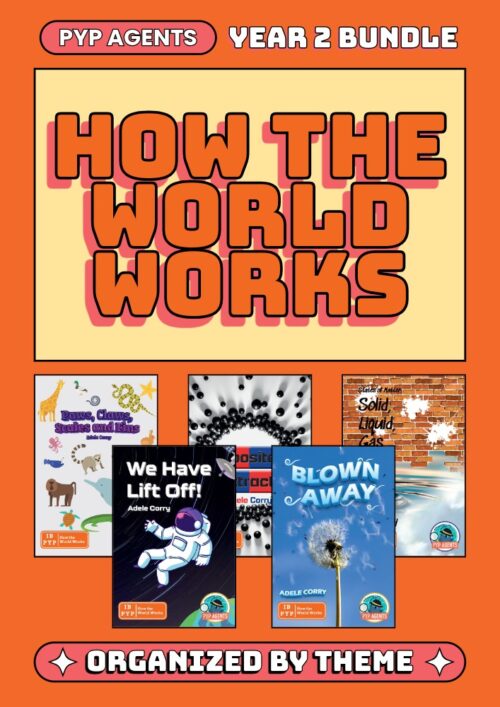 PYP Agents Year 2 How the World Works book bundle. Five books that support inquiry into the natural world and its laws, the interaction between the natural world (physical and biological) and human societies; how humans use their understanding of scientific principles; the impact of scientific and technological advances on society and on the environment. Opposites Attract: Can you find magnets in the ground? Does anything grow in a magnetic field? And how do you make a magnet at home? Find out the answers, discover how magnets are made and get pulled in to the fascinating world of magnets! [Read more…] States of Matter: Solid, Liquid, Gas: Everything in the world is made of stuff called matter. This means all living things, non-living things and even you are made of it. Find out what matter is and why it matters! [Read more…] We Have Lift Off!: Have you heard the saying, ‘What goes up, must come down’? Let’s look at the invisible force of gravity and how our lives wouldn’t be the same without it. [Read more…] Blown Away: Have you ever spotted a seed with legs? Of course not! But they still must travel away from their parent plant. Discover the clever ways that seeds glide, ride, float and even explode to travel far and wide. [Read more…] Paws, Claws, Scales and Fins: There are a lot of animals in the world. But is a duck like a crocodile because they both lay eggs? Bats and bees can fly, so are they the same? Let’s sort them out! [Read more…]
PYP Agents Year 2 How the World Works book bundle. Five books that support inquiry into the natural world and its laws, the interaction between the natural world (physical and biological) and human societies; how humans use their understanding of scientific principles; the impact of scientific and technological advances on society and on the environment. Opposites Attract: Can you find magnets in the ground? Does anything grow in a magnetic field? And how do you make a magnet at home? Find out the answers, discover how magnets are made and get pulled in to the fascinating world of magnets! [Read more…] States of Matter: Solid, Liquid, Gas: Everything in the world is made of stuff called matter. This means all living things, non-living things and even you are made of it. Find out what matter is and why it matters! [Read more…] We Have Lift Off!: Have you heard the saying, ‘What goes up, must come down’? Let’s look at the invisible force of gravity and how our lives wouldn’t be the same without it. [Read more…] Blown Away: Have you ever spotted a seed with legs? Of course not! But they still must travel away from their parent plant. Discover the clever ways that seeds glide, ride, float and even explode to travel far and wide. [Read more…] Paws, Claws, Scales and Fins: There are a lot of animals in the world. But is a duck like a crocodile because they both lay eggs? Bats and bees can fly, so are they the same? Let’s sort them out! [Read more…] -
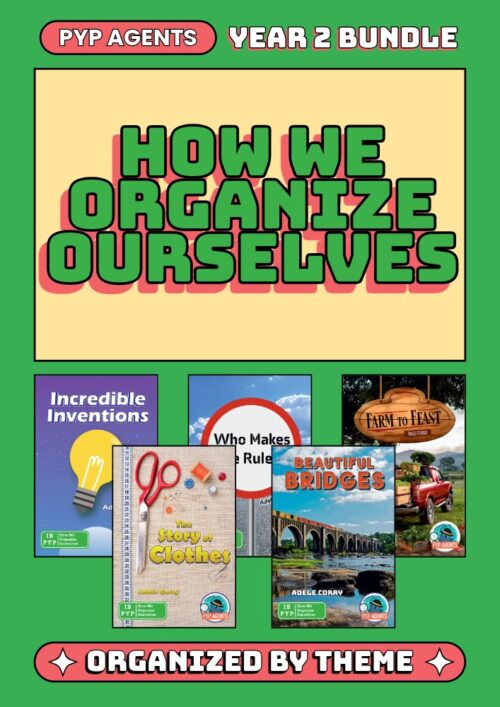 PYP Agents Year 2 How We Organize Ourselves book bundle. Five books that support inquiry into the interconnectedness of human-made systems and communities; the structure and function of organizations; societal decision-making; economic activities and their impact on humankind and the environment. The Story of Clothes: How did we invent clothes? How do we have clothes of so many colours? And where in the world are clothes made? Find out about the amazing story of your clothes and where they come from. [Read more…] Beautiful Bridges: Tower Bridge can open up, Beipanjiang Bridge is higher than the Eiffel tower, and the Golden Gate Bridge is a movie star. Discover the different types and their uses in the fascinating world of bridges! [Read more…] Incredible Inventions: Everything you use started off as someone’s idea. Some inventions changed the world. Some inventions were just silly. And some inventions haven’t been invented yet! Meet some great inventors, find out what they did and wonder if you might be next. [Read more…] Who Makes the Rules?: Everyone has to follow rules. But why do we have rules? Who makes them? And what’s the difference between a rule and a law? Find the answer to these questions and discover some of the weirder laws from around the world. [Read more…] Farm to Feast: Imagine your favourite meal ... Whether it’s something sweet, savoury or spicy, the food on your plate has travelled a long way to get there! Let’s take a journey with our favourite foods to see how they get from the fields to your plate. [Read more…]
PYP Agents Year 2 How We Organize Ourselves book bundle. Five books that support inquiry into the interconnectedness of human-made systems and communities; the structure and function of organizations; societal decision-making; economic activities and their impact on humankind and the environment. The Story of Clothes: How did we invent clothes? How do we have clothes of so many colours? And where in the world are clothes made? Find out about the amazing story of your clothes and where they come from. [Read more…] Beautiful Bridges: Tower Bridge can open up, Beipanjiang Bridge is higher than the Eiffel tower, and the Golden Gate Bridge is a movie star. Discover the different types and their uses in the fascinating world of bridges! [Read more…] Incredible Inventions: Everything you use started off as someone’s idea. Some inventions changed the world. Some inventions were just silly. And some inventions haven’t been invented yet! Meet some great inventors, find out what they did and wonder if you might be next. [Read more…] Who Makes the Rules?: Everyone has to follow rules. But why do we have rules? Who makes them? And what’s the difference between a rule and a law? Find the answer to these questions and discover some of the weirder laws from around the world. [Read more…] Farm to Feast: Imagine your favourite meal ... Whether it’s something sweet, savoury or spicy, the food on your plate has travelled a long way to get there! Let’s take a journey with our favourite foods to see how they get from the fields to your plate. [Read more…] -
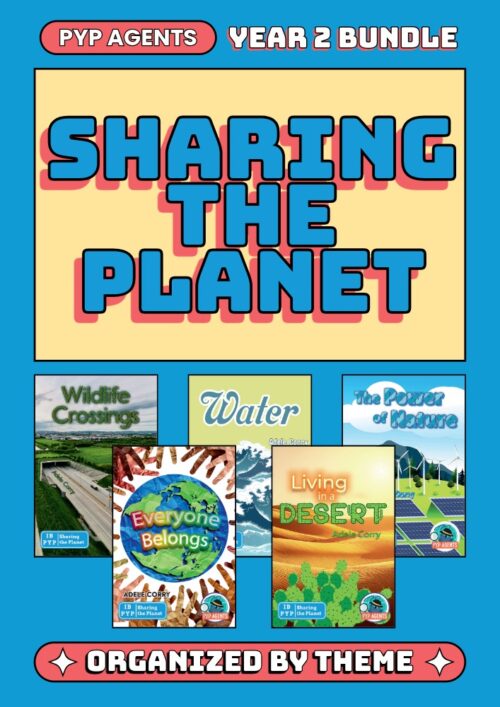 PYP Agents Year 2 Sharing the Planet book bundle. Five books that support inquiry into rights and responsibilities in the struggle to share finite resources with other people and other living things; communities and the relationship within and between them; access to equal opportunities; peace and conflict resolution. Everyone Belongs: Do you believe that help should always be shared equally? But what if someone needs less help than you? Or what if they need more help? Explore what it really means to treat people equally and be fair. [Read more…] Living in a Desert: Deserts are very dry places. Some are very hot. But did you know they can also be freezing cold and covered in ice? Find out about these amazing places, why they can be dangerous and what lives there. [Read more…] Wildlife Crossings: Humans have built roads and buildings where wild animals live. This can be dangerous for animals and us too! Discover what has been done to help crabs, monkeys, bears, turtles and even elephants travel safely. [Read more…] Water: Most of our planet is covered in water, but we can only drink a tiny bit of it. So why can’t we drink seawater? And does that mean we have to make our own water or can we find it somewhere else? [Read more…] The Power of Nature: When you’re stood on a cliff, you might feel the power of the wind. Did you know we can use that power to make electricity? This book will blow you away! [Read more…]
PYP Agents Year 2 Sharing the Planet book bundle. Five books that support inquiry into rights and responsibilities in the struggle to share finite resources with other people and other living things; communities and the relationship within and between them; access to equal opportunities; peace and conflict resolution. Everyone Belongs: Do you believe that help should always be shared equally? But what if someone needs less help than you? Or what if they need more help? Explore what it really means to treat people equally and be fair. [Read more…] Living in a Desert: Deserts are very dry places. Some are very hot. But did you know they can also be freezing cold and covered in ice? Find out about these amazing places, why they can be dangerous and what lives there. [Read more…] Wildlife Crossings: Humans have built roads and buildings where wild animals live. This can be dangerous for animals and us too! Discover what has been done to help crabs, monkeys, bears, turtles and even elephants travel safely. [Read more…] Water: Most of our planet is covered in water, but we can only drink a tiny bit of it. So why can’t we drink seawater? And does that mean we have to make our own water or can we find it somewhere else? [Read more…] The Power of Nature: When you’re stood on a cliff, you might feel the power of the wind. Did you know we can use that power to make electricity? This book will blow you away! [Read more…] -
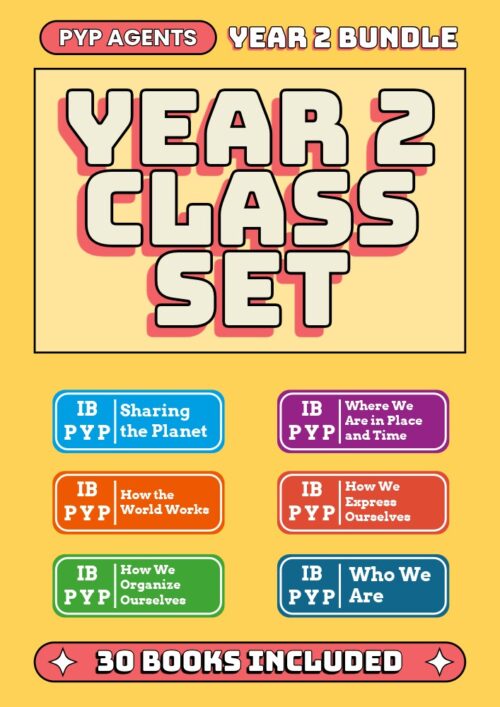 A collection of 30 non-fiction books created specifically for IB PYP Year 2 (ages 6–7+). In the class set, there are five books for each of the six transdisciplinary themes. Within every transdisciplinary theme, the books have been levelled to ensure a progression for readers. The PYP Agents series covers a wide range of exciting topics that directly support PYP units of inquiry. From the digestive system to dramatic performance, from great explorers to wildlife crossings, PYP Agents promotes inquiry, develops content knowledge and comprehension and sparks interest and engagement. 🔍 Discover the world: Using the transdisciplinary themes as a lens, delve into a world of exploration and discovery for young readers. 📖 Ignite curiosity: High-interest books for both independent and guided reading. Containing accessible text PLUS additional content for discussion, these books go beyond the traditional, levelled reader. 📚 Build vocabulary: Our non-fiction series introduces new words and terms, enriching children’s vocabulary and equipping them with language skills that extend beyond the pages.
A collection of 30 non-fiction books created specifically for IB PYP Year 2 (ages 6–7+). In the class set, there are five books for each of the six transdisciplinary themes. Within every transdisciplinary theme, the books have been levelled to ensure a progression for readers. The PYP Agents series covers a wide range of exciting topics that directly support PYP units of inquiry. From the digestive system to dramatic performance, from great explorers to wildlife crossings, PYP Agents promotes inquiry, develops content knowledge and comprehension and sparks interest and engagement. 🔍 Discover the world: Using the transdisciplinary themes as a lens, delve into a world of exploration and discovery for young readers. 📖 Ignite curiosity: High-interest books for both independent and guided reading. Containing accessible text PLUS additional content for discussion, these books go beyond the traditional, levelled reader. 📚 Build vocabulary: Our non-fiction series introduces new words and terms, enriching children’s vocabulary and equipping them with language skills that extend beyond the pages.

